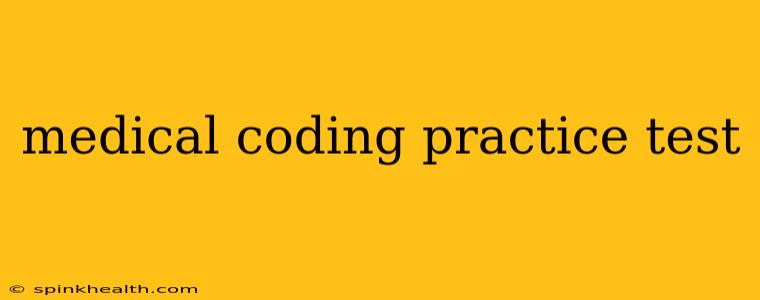Ace Your Medical Coding Exam: A Journey Through a Practice Test
The air crackled with anticipation. My heart pounded a rhythm against my ribs – a frantic drum solo preceding the final act. This wasn't a concert; this was my medical coding practice test, the dress rehearsal for the real thing. The weight of months of study, late nights fueled by caffeine and determination, rested on this single exam. It wasn't just about a passing grade; it was about charting a course towards a rewarding career in healthcare.
This isn't just another practice test; it's a story about navigating the complexities of medical coding and emerging victorious. Let's embark on this journey together, exploring some common questions and misconceptions along the way. We'll tackle scenarios, dissect codes, and, ultimately, build your confidence to conquer your exam.
What are the different types of medical coding?
The world of medical coding isn't monolithic. It's a diverse landscape with several key players:
-
ICD Codes (International Classification of Diseases): These codes are the backbone of diagnosis coding. They're used to classify diseases, injuries, and other health conditions. Think of them as the story of what happened to the patient. Imagine a patient presenting with a fractured tibia—the ICD code would reflect that specific injury. The intricacies of ICD coding require a keen eye for detail and a thorough understanding of medical terminology.
-
CPT Codes (Current Procedural Terminology): If ICD codes narrate the patient's story, CPT codes describe the actions taken. They categorize medical, surgical, and diagnostic procedures. Did the patient undergo a knee arthroscopy? A CPT code will pinpoint that specific procedure. Mastering CPT codes requires familiarity with medical procedures and their associated codes.
-
HCPCS Codes (Healthcare Common Procedure Coding System): These codes bridge the gap, covering services and supplies not found in CPT codes. Think of things like durable medical equipment (DME) or ambulance services. They extend the coding spectrum to encompass the broader range of healthcare services.
How do I prepare for a medical coding certification exam?
Preparation is key. It's a marathon, not a sprint. Here's how I tackled mine:
-
Thorough Study: I dedicated hours to mastering coding manuals, using flashcards, and taking practice quizzes. Repetition solidified my understanding of the codes and their application.
-
Practice Tests: These are invaluable. They mimic the actual exam environment, identifying my weaknesses and highlighting areas needing further study. I meticulously reviewed each missed question, analyzing my errors and understanding the underlying principles.
-
Mock Exams: Simulating the exam experience reduced test anxiety. I timed myself, mimicking the pressure of the real exam to improve my time management skills.
-
Seek Support: I joined study groups, exchanging knowledge and providing peer support. The collaborative environment helped me grasp complex concepts more effectively.
What are some common mistakes to avoid during medical coding?
Several pitfalls can derail even the most diligent coder:
-
Inaccurate Coding: This is the cardinal sin. Using the wrong code can lead to reimbursement issues and potentially impact patient care. Double-checking is paramount.
-
Lack of Specificity: Failing to provide enough detail in your codes can lead to inaccurate reimbursement. Precision is vital.
-
Ignoring Modifiers: Modifiers provide crucial extra information about the procedure or service performed, and omitting them can lead to incorrect coding.
-
Failing to Update Knowledge: Medical coding is constantly evolving, so staying up-to-date is essential.
What resources can I use to study for the medical coding exam?
Numerous resources exist to aid your journey:
-
Coding Manuals: The official CPT and ICD manuals are indispensable tools.
-
Online Courses: Many online platforms offer comprehensive coding courses.
-
Practice Exams and Books: These provide a structured path toward understanding coding principles and test-taking strategies.
-
Study Groups: Collaborating with fellow students creates a synergistic learning environment.
My journey wasn’t without its bumps. There were moments of frustration, of doubt, but perseverance paid off. That feeling of accomplishment when I finally completed the practice test, knowing I was ready, was unparalleled. It's a journey that requires dedication, but the rewards are immeasurable. So, take a deep breath, and start your own coding adventure. Remember: you've got this!

